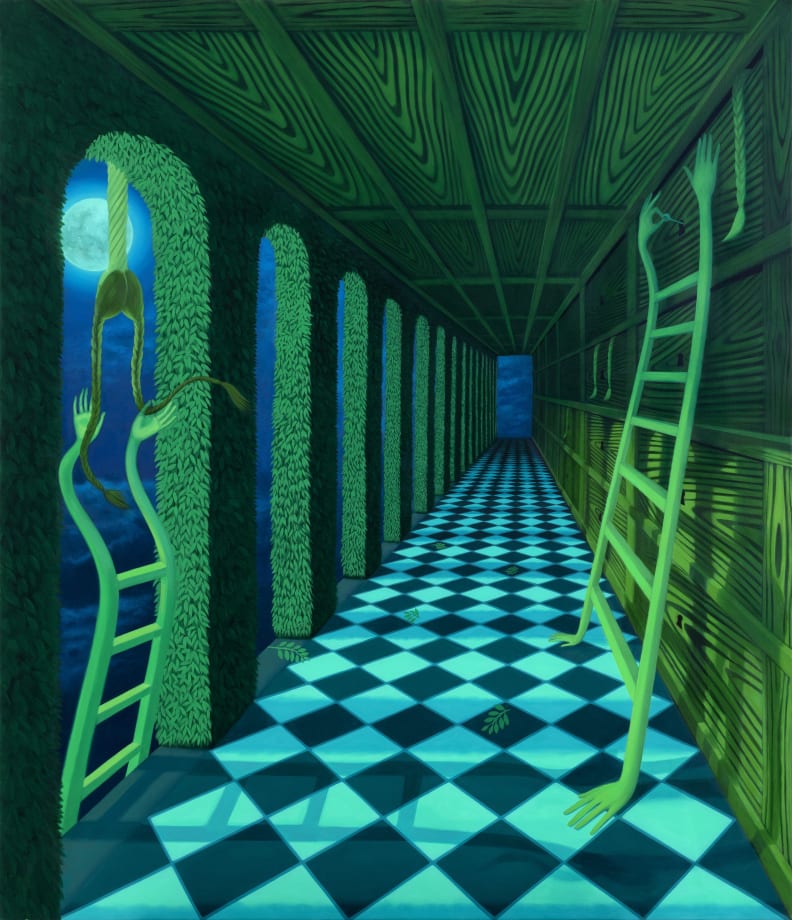Katia Lifshin | Lunar Pathways
Katia Lifshin (b.1993) is a Ukraine-born Israeli artist. In her practice, nature is a recurring theme and point of reference. Unconventional natural phenomena – such as bioluminescence or spiral tree trunks – find their way into her surrealist world, which is both inspired by everyday life as well as psychedelic experiences. The works also express a constant shift between light and darkness as an artistic interpretation of constantly- shifting emotional states. Lifshin’s work oscillates between the human and the non-human, connecting human experiences and their natural environments. Her feminine figures search their ways in the world, using their physical and mental flexibility to break boundaries and defy exterior and interior limitations.
She relocated to the U.S in 2012 and studied painting and sculpting at Pima College, Tucson, Arizona. Returning to Israel in 2018, she now lives and works in Tel-Aviv.
-
 Katia LifshinCell, 2024oil on linen70 x 90 cm.
Katia LifshinCell, 2024oil on linen70 x 90 cm.
27 1/2 x 35 3/8 in. -
 Katia LifshinHallway, 2024oil on linen112 x 130 cm.
Katia LifshinHallway, 2024oil on linen112 x 130 cm.
44 1/8 x 51 1/8 in. -
 Katia LifshinLost and Found, 2024oil on linen110 x 110 cm.
Katia LifshinLost and Found, 2024oil on linen110 x 110 cm.
43 1/4 x 43 1/4 in. -
 Katia LifshinPathways, 2024oil on linen120 x 120 cm.
Katia LifshinPathways, 2024oil on linen120 x 120 cm.
47 1/4 x 47 1/4 in. -
 Katia LifshinFall Back, 2024oil on linen80 x 80 cm.
Katia LifshinFall Back, 2024oil on linen80 x 80 cm.
31 1/2x 31 1/2 in. -
 Katia LifshinTender Kiss, 2024oil on linen80 x 100 cm.
Katia LifshinTender Kiss, 2024oil on linen80 x 100 cm.
31 1/2x 39 3/8 in. -
 Katia LifshinKaleidoscope, 2024oil on linen93 x 110 cm.
Katia LifshinKaleidoscope, 2024oil on linen93 x 110 cm.
36 5/8 x 43 1/4in. -
 Katia LifshinSynaptic Pruning, 2024oil on linen110 x 110 cm.
Katia LifshinSynaptic Pruning, 2024oil on linen110 x 110 cm.
43 1/4 x 43 1/4 in.
Galerie Kandlhofer is thrilled to present a series of new paintings by Katia Lifshin (b. 1993, Ukraine). This new body of work offers a surreal exploration of the connection between psychological spaces and physical realms, opening a painterly portal to the complexity of our inner worlds.
Alluding to M.C. Escher’s impossible structures and fantastical typographies, Lifshin plays with the boundless possibilities of space, warping dimensions in her other-worldly environments of labyrinthine mazes, corridors and archways. The characters and the features of their world, initially appear plausible, but defy logic and gravitational principles in multi-layered distortions of realism and surrealism. Bathed in a nocturnal blue glow, planes of the paintings shift from areas of bright moonlight, to pools of inky, sinister shadow, an oscillation of colour, light and composition, creating a deep sensation of ambiguity.
This aura of uncertainty extends to the cast of characters who possess an uncanny quality. Some march with purpose, others are suspended and appear disorientated. In some paintings, only fragments of the body are shown, legs kicking as they fall, or float, into the depths of dark mazes. Bodies become twisted, elongated and anthropomorphised as they stretch into ropes or ladder legs. Hands grasping scissors emerge, appearing to prune and maintain leafy arches, while contributing to an ominous atmosphere as they glint in the moonlight, encroaching dangerously near the head of another figure.
Lifshin invokes the rich cultural and art-historical symbolism of the garden as the natural world, positioning it as a recurring space and compositional motif, highlighting its possibility as both a place of sanctuary and a site of uncontrolled danger. The moon is an ever-present and recurring feature, and while it evokes a feeling of dreamlike serenity, it catches on the threshold of eerie otherworldliness. In Lifshin's paintings, the moon also operates as a metaphor for observation, as these figures, always watched, populate the endless turns of panoptic mazes and labyrinths. Here, the viewer is invited to consider for themselves, if these are spaces of safety and refuge, or as traps, ready to confine. Pictured in the act of tending to the spaces themselves, Lifshin further complicates the subject, questioning if these figures cultivate the very cages that cage them?
Lifshin’s worlds are evocative explorations of the complex, often contradictory, nature of the spaces we create for ourselves. Spanning the physical to the metaphorical, these enigmatic expanses reveal how personal, subjective and subconscious moments can intuitively merge with the universal and themselves contain a multitude of shifts – from light to darkness, across the spectrum of emotional space, across the boundaries of the body and between the realm of the human to the non-human - where limits and edges blur.











